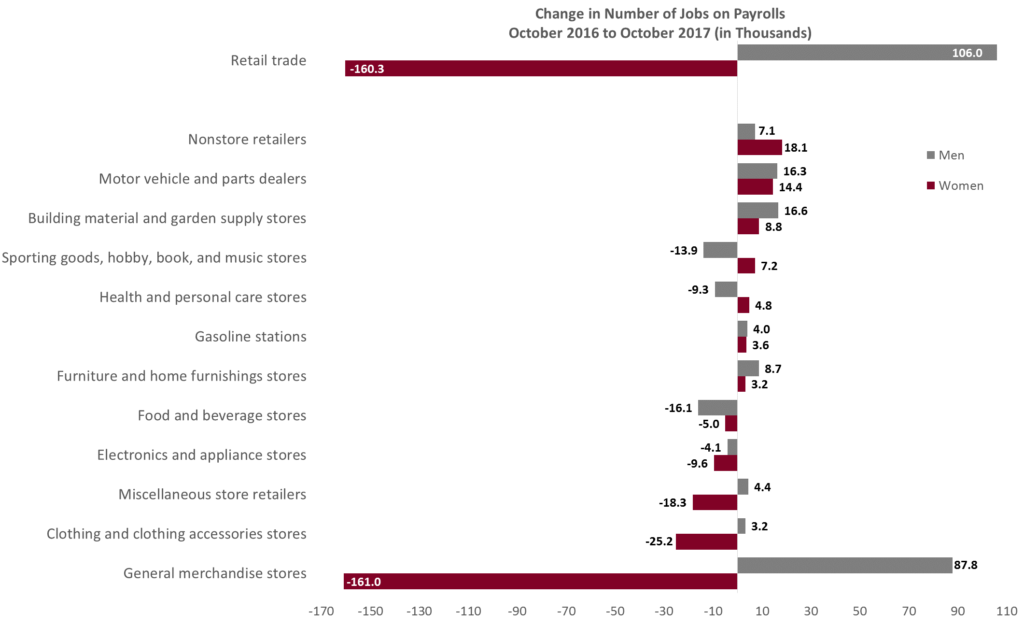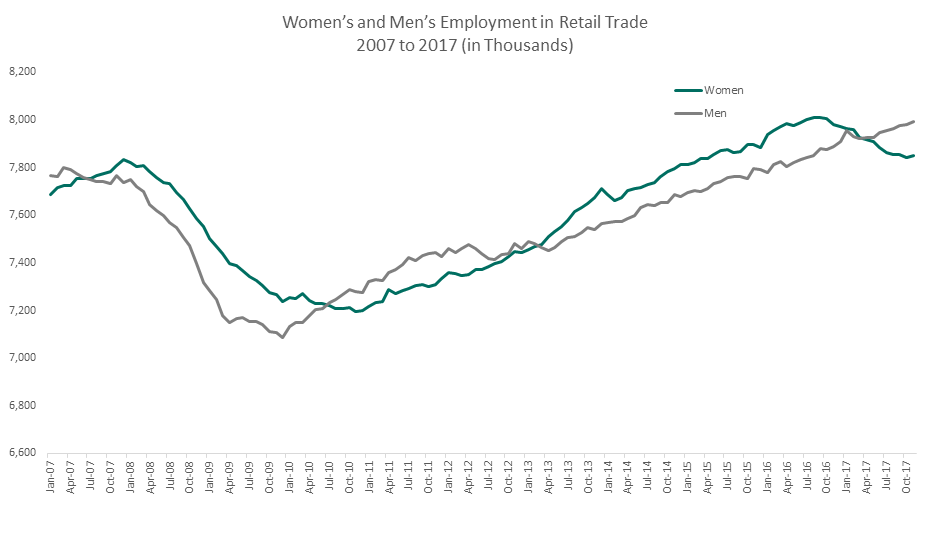Men gained retail jobs over the last year, despite overall job loss in the industry
The Institute for Women’s Policy Research (IWPR) analysis of the December employment report from the U.S. Bureau of Labor Statistics (BLS) establishment survey finds that, over the last year (November 2016 – November 2017), women gained fewer jobs than men: women gained 985,000, while men gained 1,086,000 jobs.
Among industries, Retail Trade suffered the greatest job losses over the last year. Analyzing the industry job gains by gender, IWPR found that women shouldered the entirety of the job losses in Retail Trade, while men actually gained jobs in the industry (Figure 1). Women’s share of all retail trade jobs fell from 50.4 to 49.6 percent.
Figure 1. Women Lost Jobs in Retail since November 2016, While Men Gained

Figure 2 shows the trends in men’s and women’s retail job growth since January 2007, reflecting the trends during and after the Great Recession. Men’s retail declines preceded women’s before the Great Recession, while men’s job gains preceded women’s during the recovery. Women’s recent job losses in retail show a reverse trend, with women seeing sustained losses over the last year—the longest stretch of job losses in the industry for women or men since the Great Recession—while men have continued to gain retail jobs.
Figure 2. Women’s Retail Jobs on the Decline, while Men’s Still on the Rise

Note: To illustrate changes more clearly, Y-axis does not start at zero.
Source: IWPR analysis of U.S. Department of Labor Bureau of Labor Statistics, Current Employment Statistics (December 14, 2017)
The BLS December employment report provides industry detail by gender for October 2017. Retail Trade lost 54,300 jobs between October 2016 and October 2017, but the experiences between men and women in retail were starkly different: during this time period, women lost 160,300 jobs, while men gained 106,000 jobs. Figure 3 shows that almost all of the losses in retail came from women’s job loss in general merchandising stores, while men actually gained 87,800 jobs in general merchandising. In October 2017, women were 60.4 percent of General Merchandise Store workers, down from 64 percent in October 2016.
In other areas of Retail Trade, women saw losses in Clothing and Clothing Accessories stores, while men saw losses in Food and Beverage Stores and Sporting Goods, Hobby, Book, and Music Stores. Both men and women saw gains in Nonstore Retailers, Motor Vehicle and Parts Dealers, and Building Material and Garden Supply Stores.
Figure 3. Overall Retail Jobs Losses Felt Mainly by Women in General Merchandise Stores

Source: IWPR analysis of U.S. Department of Labor Bureau of Labor Statistics, Current Employment Statistics (December 8, 2017)
This quick figure was prepared by Jennifer Clark, Emma Williams Baron, and Heidi Hartmann, Ph.D., at the Institute for Women’s Policy Research (IWPR)
The Institute for Women’s Policy Research (IWPR) conducts and communicates research to inspire public dialogue, shape policy, and improve the lives and opportunities of women of diverse backgrounds, circumstances, and experiences. The Institute’s research strives to give voice to the needs of women from diverse ethnic and racial backgrounds across the income spectrum and to ensure that their perspectives enter the public debate on ending discrimination and inequality, improving opportunity, and increasing economic security for women and families. The Institute works with policymakers, scholars, and public interest groups to design, execute, and disseminate research and to build a diverse network of individuals and organizations that conduct and use women oriented policy research. IWPR’s work is supported by foundation grants, government grants and contracts, donations from individuals, and contributions from organizations and corporations. IWPR is a 501(c)(3) tax exempt organization that also works in affiliation with the women’s studies and public policy and public administration programs at The George Washington University.
About the author
Jennifer Clark is the former Director of Communications for the Institute for Women’s Policy Research (IWPR), overseeing the Institute’s media relations, website development, publications production, and online communications efforts on a range of issues including women’s roles in the workforce, student parents in college, Social Security, paid sick days and paid family leave, and the status of women in the United States. In 2015, she spearheaded the public relations and external outreach strategy behind the 2015 relaunch of the Institute’s signature Status of Women in the States project, which garnered national coverage in The Washington Post, The Atlantic, The Wall Street Journal, CBS This Morning, and MSNBC’s Morning Joe, among others and inspired special features in Glamour Magazine and The Daily Show with Jon Stewart. She regularly provides strategic communications advice and media relations support to IWPR’s local partners and has presented on community outreach strategies at conferences, webinars, and events hosted by Women’s Funding Network, Women in Government, and Women’s Legislators’ Lobby/Women’s Actions for New Directions (WILL/WAND).
In between roles at IWPR, she served as the Income Security Outreach Manager at the National Academy of Social Insurance, managing a Social Security public education project, which coordinated a network of 30 organizations working to educate vulnerable populations on the importance of Social Security. She graduated from Boston University with a Bachelor of Arts in American History and International Relations.
Emma Williams-Baron was a Policy and Data Analyst at IWPR and Assistant Editor for the Journal of Women, Politics & Policy, focusing on job quality, pay equity across the life course, work-life policy, and intersectional analysis. She began at IWPR as a Mariam K. Chamberlain Fellow in 2015.
Previously, she was a research assistant investigating gendered violence with Dr. Alexandra Hrycak, and a legislative intern at the San Francisco Department on the Status of Women.
As an undergraduate student, Emma presented a senior thesis titled Girls and Boys Who Work: Effects of Gendered Adolescent Work Experiences on Career, Education, Family, and Work-Life Balance Aspirations and Expectations. Since joining IWPR, Emma has given several presentations at national and international conference including sharing findings from her study of youth work experience and attitudes toward career and family at the 2016 Work and Family Researchers Network Conference and presenting conclusions from her work with Dr. Hrycak at the 2016 Association for the Study of Nationalities 21st Annual World Convention.
Emma is a 2015 graduate of Reed College with a B.A. in sociology.
Heidi Hartmann is the President Emerita and Senior Research Economist at the Washington-based Institute for Women’s Policy Research (IWPR), a scientific research organization that she founded in 1987 to meet the need for women-centered, policy-oriented research. Dr. Hartmann is also a Distinguished Economist In-Residence for Gender and Economic Analysis at American University and serves as the Editor of the Journal of Women, Politics & Policy.
Dr. Hartmann lectures internationally on women, economics, and public policy; frequently testifies before the U.S. Congress; and is often cited as an authority in various media outlets, such as CNN, ABC News, The New York Times, and PBS NewsHour. She has published numerous articles in journals and books and her work has been translated into more than a dozen languages. She is a co-author of several IWPR reports, including Women’s and Men’s Employment and Unemployment in the Great Recession; Still A Man’s Labor Market: The Long-Term Earnings Gap; Unnecessary Losses: Costs to Americans of the Lack of Family and Medical Leave; Equal Pay for Working Families, and Strengthening Social Security for Women. She served as Chair of the Board of the American Academy of Political Science, and Treasurer of the National Council of Women’s Organizations.
Prior to founding IWPR, Dr. Hartmann was on the faculties of Rutgers University and the New School for Social Research and worked at the National Research Council/National Academy of Sciences and the U.S. Commission on Civil Rights. In 1994, Dr. Hartmann was the recipient of a MacArthur Fellowship Award for her work in the field of women and economics. She is an economist with a B.A. from Swarthmore College and M. Phil and Ph.D. degrees from Yale University, all in economics. She is the recipient of two honorary degrees. She was named a Charlotte Perkins Gilman Fellow by the American Academy of Political and Social Science in 2014, and in 2017 she received the Distinguished Career Award from the American Sociological Association.
-
Heidi Hartmann
-
Heidi Hartmann
-
Heidi Hartmann
-
Heidi Hartmann
-
Heidi Hartmann
-
Heidi Hartmann
-
Heidi Hartmann
-
Heidi Hartmann
-
Heidi Hartmann
-
Heidi Hartmann
-
Heidi Hartmann
-
Heidi Hartmann
-
Heidi Hartmann
-
Heidi Hartmann
-
Heidi Hartmann
-
Heidi Hartmann
-
Heidi Hartmann
-
Heidi Hartmann
-
Heidi Hartmann
-
Heidi Hartmann
-
Heidi Hartmann
-
Heidi Hartmann
-
Heidi Hartmann
-
Heidi Hartmann
-
Heidi Hartmann
-
Heidi Hartmann
-
Heidi Hartmann
-
Heidi Hartmann
-
Heidi Hartmann
-
Heidi Hartmann
-
Heidi Hartmann
-
Heidi Hartmann
-
Heidi Hartmann
-
Heidi Hartmann
-
Heidi Hartmann
-
Heidi Hartmann
-
Heidi Hartmann
-
Heidi Hartmann
-
Heidi Hartmann
-
Heidi Hartmann
-
Heidi Hartmann
-
Heidi Hartmann
-
Heidi Hartmann
-
Heidi Hartmann
-
Heidi Hartmann
-
Heidi Hartmann
-
Heidi Hartmann
-
Heidi Hartmann





